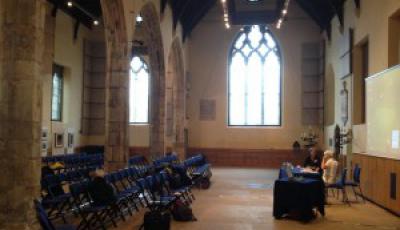On Monday, 1 July 2013, an interesting and thought-provoking seminar, ‘The Politics of Detention’, was held at the National Centre for Early Music in York, UK. Organised by Dr Alex Hall of the University of York, the seminar was well attended by academics, students, practitioners, artists, and activists from the UK as well as countries such as France, Canada, and Australia.

The Politics of Detention seminar sought to consider some of the following questions:
- What kinds of subjects are produced by detention?
- How do detention practices differentially value people and lives?
- What kinds of authority, knowledge, and expertise shape detention?
- Through what devices does detention constrain dissent and protestation, and how are these devices experienced?
- What challenges face those who wish to open spaces for the political contestation of detention?
- To what extent does contemporary detention blur the lines between protection, prevention, and punishment?
The presentations by each of the eight speakers touched upon these and other questions as a means to reflect on the politics of detention.
In the first session of the day, Frances Webber of the Institute for Race Relations (London, UK) provided some context to detention practices in the UK and the political environments that enable the detention of foreign national offenders after the completion of their sentences. Speaking to the Australian context, Caroline Fleay of Curtin University (Perth, Australia) argued that the practice of mandatory immigration detention has been normalised in the country, yet there is a lack of an independent monitoring system to ensure detainees’ rights are properly observed.
In the second session, Chowra Makaremi of L’École des Hautes Études en Sciences Sociales (Paris, France) provided a conceptually rich discussion of the fluidity and flexibility of borders at French airports to be drawn and redrawn around irregular migrants as a means to keep them ‘outside’ of France and within extraterritorial spaces of detention. Vicki Squire of the University of Warwick (Warwick, UK) discussed the invisibility of immigration detention in the United States, arguing that detention is a hidden practice and that forms of protest can make detention visible. Jerome Phelps of Detention Action (London, UK) questioned the political context that both enables and maintains immigration detention and highlighted the need to break down barriers between ‘us’ and ‘them’ in how the issue of irregular migration is handled.
In the third session of the day, Anna Pratt of York University (Toronto, Canada) spoke about the Canadian context and the interplay between crime, national security, and immigration detention to produce certain individuals as detainable and deportable.
In the final session, Melanie Friend of the University of Sussex (Brighton, UK) presented from her highly engaging work Border Country, which included photographic images and audio clips from her research in immigration removal centres in the UK. The final speaker of the day, Don Flynn of the Migrants’ Rights Network (London, UK), summarised some of the dilemmas, tensions, and conflicts associated to the issue of immigration detention and the challenge of changing the current politics and practices.
The presentations and discussions throughout the day highlighted both differences and similarities of immigration detention practices among different jurisdictions, as well as the importance of on-going dialogue among academics and practitioners to share expertise and knowledge.
More information about the seminar series can be found here.
Keywords:
Share:








